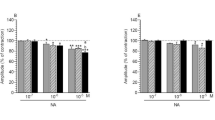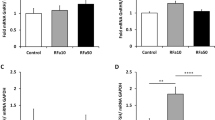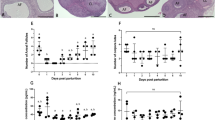Abstract
PELVIC relaxation in pregnant females has been studied for several species of small animals and for primates1. Experimental investigations on the hormonal control of this process in mice and guinea pigs are encountered frequently in the current literature. Less attention has been given to this aspect of reproductive physiology in farm animals. Work is at present in progress at Ruakura on pelvic relaxation in sheep. Study of the factors involved are important in the understanding of parturition problems such as dystocia and vaginal prolapse.
This is a preview of subscription content, access via your institution
Access options
Subscribe to this journal
Receive 51 print issues and online access
$199.00 per year
only $3.90 per issue
Buy this article
- Purchase on Springer Link
- Instant access to full article PDF
Prices may be subject to local taxes which are calculated during checkout
Similar content being viewed by others
References
Hisaw, F. L., and Zarrow, M. X., “Vitamins and Hormones”, 8, 151 (Academic Press, Inc., N.Y., 1950).
Bassett, E. G., Sewell, O. K., and White, E. P. (in the press).
Author information
Authors and Affiliations
Rights and permissions
About this article
Cite this article
BASSETT, E., PHILLIPS, D. Pelvic Relaxation in Sheep. Nature 174, 1020–1021 (1954). https://doi.org/10.1038/1741020a0
Issue Date:
DOI: https://doi.org/10.1038/1741020a0
This article is cited by
-
Gestational Changes in Connective Tissue in the Ewe
Nature (1958)
Comments
By submitting a comment you agree to abide by our Terms and Community Guidelines. If you find something abusive or that does not comply with our terms or guidelines please flag it as inappropriate.



